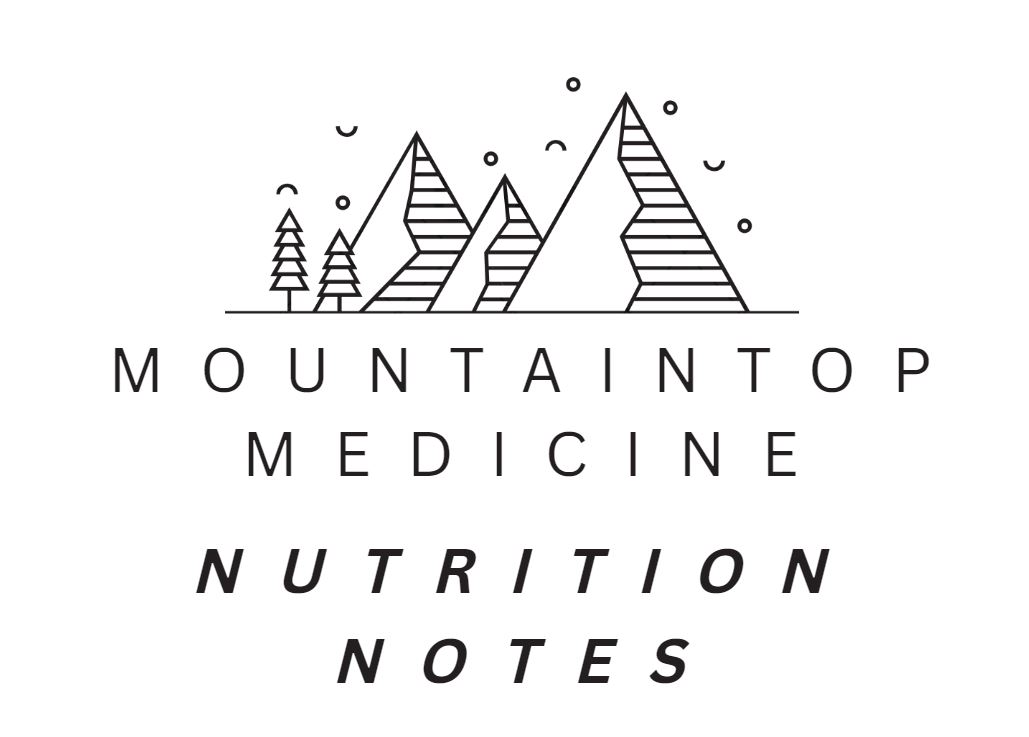Mountaintop Medicine: Nutrition Notes — My Best Tips to Lose Weight Naturally

Hello again, welcome back to Mountaintop Medicine Nutrition Notes! In this week’s edition I want to discuss the popular nutrition topic of weight loss. As a dietitian, I am often asked a question like, “What is the best way to lose weight?” Which can be a tricky question. Weight loss is dependent on several genetic and lifestyle factors. This means that your genes, diet, exercise regimen, sleep schedule, and mental state can all play a role in how fast and efficiently you can lose weight.
Here are some of my best tips for sustainable weight loss from a nutrition standpoint:
1. Prioritize eating whole foods. This is one of the best things you can do to become healthier. Whole, single ingredient foods are rich in a variety of nutrients such as vitamins, minerals, fiber, healthy fats, and quality protein. Weight loss is often a natural side effect of sticking to whole foods.
2. Limit processed, convenient, and fast foods. Following my first tip, prioritizing whole foods and ditching junk food helps you cut out excessive calories, added fat, sugars, and salt. Did you know that processed foods are engineered to make you want to eat as much as possible? They are much more likely to cause addictive-like eating rather than unprocessed foods. Weight gain, heart disease, diabetes, cancers, and neurogenerative diseases like dementia can all be attributed to processed foods.
3. Ditch added sugars that are found in coffees, sodas, and sweet foods like candies, cakes, cookies, cereals, and ice cream. Eating excessive amounts of added sugars can cause weight gain and chronic health conditions like diabetes.
4. Avoid fad diets at all costs. Dieting in such a way that restricts entire food groups or specific nutrients is an unsustainable approach to weight loss.
5. Focus on adding protein to your diet. A high-protein diet has many benefits for weight loss and for our overall health in general. It helps us to feel fuller for longer and reduces appetite and helps maintain lean body mass. Our bodies burn more calories to digest the protein we eat.
6. Get in plenty of fiber. Eat more fruits, vegetables, whole grains, beans, and legumes as they aid our digestion and promote healthy bowel movements. Fiber also helps reduce the chance of chronic disease development.
7. Shop on the outside perimeter of the grocery store. Nutritious, whole foods such as fruits, vegetables, lean proteins, and other perishables. Although, you can find many healthy choices in the center aisles, including bulk whole grains, nuts, seeds, nut butters, low sodium canned foods, condiments, and frozen fruits and vegetables.
8. Carry nutritious snacks. Whether you have a busy day planned, work a long shift, or know you may not have a chance to grab a bite to eat, keep easy healthy snacks with you when possible. Try to have a source of lean protein and fiber such as an apple with string cheese or peanut butter or trail mix.
9. Stay hydrated. Drinking enough water every day is vital for our health as our bodies depend on it for vital functions. Aim to drink at least 64 to 96 ounces of water a day.
10. Practice mindful eating. This is a method to increase awareness while eating. It helps you make conscious food choices depending on your hunger and satiety cues. Try eating slowly and without distractions like your phone, tablet, computer, or TV and you will notice as you become full from your meal.
11. Other lifestyle changes should include adding strength training and other resistance exercises as well as some sort of cardio. These types of physical activity in combination are a fantastic way to burn calories, improve your physical and mental health, and prevent a loss of muscle mass as you lose weight. Getting enough sleep is also incredibly important for weight loss because sleep deprivation disrupts regulation of our appetite hormones.

Leah Gardner, EPH Registered Dietitian
As a reminder, I am now offering outpatient nutrition counseling and education services at Estes Park Health. If you are interested, please contact your healthcare provider for a referral. If you have any questions or if there are any nutrition-related topics that you would like me to discuss here on Nutrition Notes, please reach out at LGardner@EPH.org.


